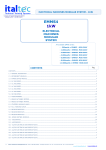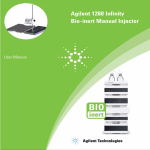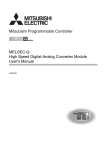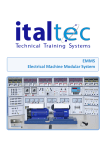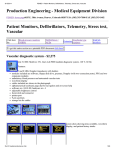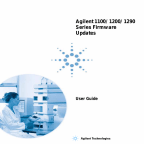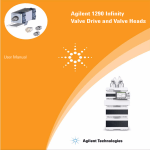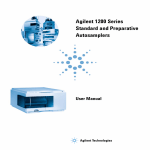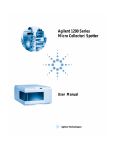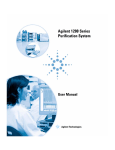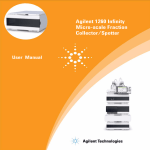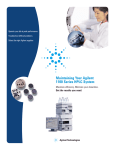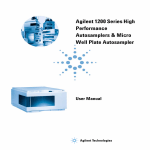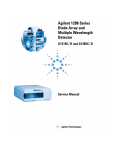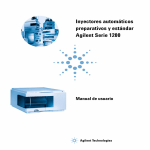Download Agilent 1200 Agilent 1200 Series Valves User Manual
Transcript
Agilent 1200 Series Valves User Manual Agilent Technologies Notices © Agilent Technologies, Inc. 2006 Warranty No part of this manual may be reproduced in any form or by any means (including electronic storage and retrieval or translation into a foreign language) without prior agreement and written consent from Agilent Technologies, Inc. as governed by United States and international copyright laws. The material contained in this document is provided “as is,” and is subject to being changed, without notice, in future editions. Further, to the maximum extent permitted by applicable law, Agilent disclaims all warranties, either express or implied, with regard to this manual and any information contained herein, including but not limited to the implied warranties of merchantability and fitness for a particular purpose. Agilent shall not be liable for errors or for incidental or consequential damages in connection with the furnishing, use, or performance of this document or of any information contained herein. Should Agilent and the user have a separate written agreement with warranty terms covering the material in this document that conflict with these terms, the warranty terms in the separate agreement shall control. Manual Part Number G1156-90010 Edition 02/06 Printed in Germany Agilent Technologies Hewlett-Packard-Strasse 8 76337 Waldbronn, Germany defined in FAR 52.227-19(c)(1-2) (June 1987). U.S. Government users will receive no greater than Limited Rights as defined in FAR 52.227-14 (June 1987) or DFAR 252.227-7015 (b)(2) (November 1995), as applicable in any technical data. Safety Notices CAUTION A CAUTION notice denotes a hazard. It calls attention to an operating procedure, practice, or the like that, if not correctly performed or adhered to, could result in damage to the product or loss of important data. Do not proceed beyond a CAUTION notice until the indicated conditions are fully understood and met. Technology Licenses The hardware and/or software described in this document are furnished under a license and may be used or copied only in accordance with the terms of such license. Restricted Rights Legend If software is for use in the performance of a U.S. Government prime contract or subcontract, Software is delivered and licensed as “Commercial computer software” as defined in DFAR 252.227-7014 (June 1995), or as a “commercial item” as defined in FAR 2.101(a) or as “Restricted computer software” as defined in FAR 52.227-19 (June 1987) or any equivalent agency regulation or contract clause. Use, duplication or disclosure of Software is subject to Agilent Technologies’ standard commercial license terms, and non-DOD Departments and Agencies of the U.S. Government will receive no greater than Restricted Rights as WA R N I N G A WARNING notice denotes a hazard. It calls attention to an operating procedure, practice, or the like that, if not correctly performed or adhered to, could result in personal injury or death. Do not proceed beyond a WARNING notice until the indicated conditions are fully understood and met. Agilent 1200 Series Valves In This Guide… The Agilent 1200 Series valves provide the user a comprehensive solutions for more flexibility through solvent selection and column selection. They offer new automation capabilities for sample preparation as well as higher sample throughput with alternating column regeneration. The Agilent 1200 Series valves are fully integrated in the CAN environment (control area network) of the Agilent 1200 Series LC system and can be controlled by the Agilent ChemStation Software. The following types of valves will be described in this manual: • G1157A Agilent 1200 Series 2 Position/10 Port Valve • G1158A Agilent 1200 Series 2 Position/ 6 Port Valve • G1159A Agilent 1200 Series 6 Position Selection Valve • G1160A Agilent 1200 Series 12 Position/13 Port Selection Valve • G1162A Agilent 1200 Series 2 Position/ 6 Port Micro Valve • G1163A Agilent 1200 Series 2 Position/10 Port Micro Valve These valves and the corresponding capillary kits for alternating column regeneration, sample enrichment, sample clean-up, column selection or solvent selection will allow you to implement these applications easily. Chapter 1, “Installation and Configuration,” starting on page 7 will describe how to install and configure the Agilent 1200 Series valves. Chapter 2, “Operation,” starting on page 17 will describe the Agilent ChemStation valve interface and how to setup the valves in your analytical method. Chapter 3, “Maintenance, Repair, and Troubleshooting,” starting on page 25 will describe recommended maintenance and repair procedures as well as troubleshooting tools. Agilent 1200 Series Valves 3 Chapter 4, “Valve Applications,” starting on page 39 will describe common application, e.g. alternating column regeneration, and how to setup your valves for these applications. 4 Agilent 1200 Series Valves contents Contents 1 Installation and Configuration Site Requirements 8 Unpacking the Agilent 1200 Series valve Damaged Packaging 9 Delivery Checklist 9 9 Hardware Installation 12 Setting up the CAN connection 13 Setting up the power connection to other Agilent 1200 Series LC modules 13 Setting up the power connection to the external power supply 13 Software Configuration 2 14 Operation Operating the Valve using Agilent ChemStation Handheld Controller functions 3 18 22 Maintenance, Repair, and Troubleshooting Status Indicators 26 Maintenance and Repair 27 Replacing the stator face and the rotor seal for standard valves (G1157A, G1158A, G1159A, G1160A) 28 Replacing the rotor seal for micro valves (G1162A and G1163A) 30 Early Maintenance Feedback (EMF) 32 System Errors and Troubleshooting System Errors 34 Valve Synchronization 37 Agilent 1200 Series Valves 34 5 contents 4 Valve Applications Alternating Column Regeneration 40 Sample enrichment and Sample stripping Sample enrichment 44 Sample stripping 45 5 Column Selection 48 Solvent Selection 50 44 Parts General Parts 54 Capillaries and Fittings for analytical and preparative flow rates 56 Capillaries and Fittings for micro valves 57 6 Specifications 7 Safety Information General Safety Information 66 Lithium Batteries Information Radio Interference Sound Emission 70 71 Solvent Information 72 Agilent Technologies on Internet Index 6 69 73 75 Agilent 1200 Series Valves Agilent 1200 Agilent 1200 Series Valves User Manual 1 Installation and Configuration Site Requirements 8 Unpacking the Agilent 1200 Series valve 9 Hardware Installation 12 Software Configuration 14 Agilent Technologies 7 1 Installation and Configuration Site Requirements Site Requirements The requirements for the Agilent 1200 Series Valves are displayed Table 1 and Table 2 on page 8. The 24 Volts DC power can be supplied by an external power supply (0950-4422) or by one of the following Agilent 1200 Series LC modules with DC CAN adapter. • Agilent 1200 Series preparative pump (G1361A) • Agilent 1200 Series fraction collectors (G1364A, G1364B, G1364C, G1364D) • Agilent 1200 Series high performance autosampler(G1367B) • Agilent 1200 Series micro well-plate autosampler (G1377A) • Agilent 1200 Series dual-loop autosampler PS (G2258A) Table 1 Site Requirements for Agilent 1200 Series Valves Type Specification • Weight 1.9 Kg (4.2 lbs) • Dimensions • (height x width x depth) 92 x 84 x 200 mm (9.2 x 3.3 x 8.0 inches) • Power supply 24 Volts DC (1.7 amps) • Ambient operating temperature 4 to 55°C (39 to 131°F) • Humidity < 95%, non-condensing • Safety Standards IEC, CSA, UL, EN Installation category II, pollution degree 2 For indoor use only Table 2 System Requirements Revision 8 • Agilent 1200 Firmware A.05.04 and higher • Control Module Firmware G1323B B.03.11 and higher • Agilent ChemStation Software A.09.03 and higher Agilent 1200 Series Valves Installation and Configuration 1 Unpacking the Agilent 1200 Series valve Unpacking the Agilent 1200 Series valve Damaged Packaging If the delivery packaging shows signs of external damage, please call your Agilent Technologies sales and service office immediately. Inform your service representative that the Agilent 1200 Series valve may have been damaged during shipment. CAUTION If there are signs of damage, please do not attempt to install the valve. Delivery Checklist Ensure all parts and materials have been delivered with the Agilent 1200 Series valve. The delivery checklists are displayed in Table 3 (for G1157A, G1158A, G1159A, G1160A) and in Table 4 (for G1162A, G1163A). Please report missing or damaged parts to your Agilent Technologies sales and service office. Table 3 Delivery checklist for Agilent 1200 Series valves G1157A, G1158A, G1159A and G1160A Quantity Description 1 Agilent 1200 Series Valve 1 Declaration of conformity 1 Rail assembly for Column Organizer 1 Accessory kit containing 1 • CAN Cable, 1m long 5181-1519 1 • DC-CAN cable 5181-1533 10 • Fitting Screw long 5065-4454 12 • Fitting Screw extra long 5065-9967 (10/pk) Agilent 1200 Series Valves Part Number 9 1 Installation and Configuration Unpacking the Agilent 1200 Series valve Table 3 Delivery checklist for Agilent 1200 Series valves G1157A, G1158A, G1159A and G1160A (continued) Quantity Description Part Number 1 • Hex Key 9/64” T-handle 8710-2394 1 • Hex Key 3/32” 1 • wrench 8710-0510 1 • socket wrench (Rheotool) 1/4 8710-2391 Table 4 Delivery checklist for Agilent 1200 Series micro valves G1162A and G1163A Quantity Description Part Number 1 Agilent 1200 Series Micro Valve 1 Declaration of conformity 1 Rail assembly for Column Organizer 5065-4450 6/10 M4 micro valve fittings 5065-4410* 1 M4 micro valve plug 5065-4410† 1 Accessory kit containing 1 • CAN Cable, 1m long 5181-1519 1 • DC-CAN cable 5181-1533 1 • Hex Key 9/64” T-handle 8710-2394 1 • Hex Key 3/32” 1 • wrench 8710-0510 1 • socket wrench (Rheotool) 1/4 8710-2391 * The consumable kit 5065-4410 contains six M4 micro valve fittings. † The consumable kit 5065-4410 contains two M4 micro valve plugs. The M4 micro valve fittings support the Agilent PEEK coated fused silica capillaries (O.D. 0.8mm or 1/32”). The M4 micro valve plug is supplied for pressure (leak) testing. 10 Agilent 1200 Series Valves Installation and Configuration 1 Unpacking the Agilent 1200 Series valve For a list of recommended Agilent PEEK coated fused silica capillaries can be found in the chapter “Capillaries and Fittings for micro valves" on page 57. Agilent 1200 Series Valves 11 1 Installation and Configuration Hardware Installation Hardware Installation The Agilent 1200 Series valves can be installed in two different ways. They can either be placed on free bench space near the Agilent 1200 Series LC system or they can be mounted on the G1383A Agilent 1200 Series column organizer. The column organizer should be located on the right side of the Agilent 1200 Series stack, which includes the autosampler. In order to install a valve on the G1383A Column Organizer the Organizer Rail Assembly must be installed on the two mounting poles using the clips from the Organizer Rail Assembly. All External Valves have a bracket on the side which slides over the metal part of the Organizer Rail Assembly. Two CAN connectors and one DC-CAN connector are located at the back panel of the valve assemblies as displayed in Figure 1. CAN-DC-Out CAN port Figure 1 12 Back Panel of the Agilent 1200 Series Valves Agilent 1200 Series Valves Installation and Configuration 1 Hardware Installation Setting up the CAN connection Connect the CAN-Cable (PN 5181-1519) to one of the CAN ports at back panel of the Agilent 1200 Series valve and to a free CAN-Port on another Agilent 1200 Series module. The second CAN-Port can be used to add additional valves or modules to the HPLC system. Setting up the power connection to other Agilent 1200 Series LC modules The power for the Agilent 1200 Series valves can be supplied by one of the following Agilent 1200 Series modules: • Agilent 1200 Series preparative pump (G1361A) • Agilent 1200 Series fraction collectors (G1364A, G1364B, G1364C, G1364D) • Agilent 1200 Series high performance autosampler (G1367B) • Agilent 1200 Series micro well-plate autosampler (G1377A) • Agilent 1200 Series dual-loop autosampler PS (G2258A) Connect the DC-CAN Cable (PN 5181-1533) to the DC-CAN connector at the back panel of the valve and to the DC-CAN connector on one of the Agilent 1200 Series modules listed above. Setting up the power connection to the external power supply If none of the Agilent 1200 Series modules from the list above is part of your HPLC system, you have to supply the power through an external power supply (P/N 0950-4422). Plug the DC-CAN adapter from the power supply into the DC-CAN connector on the back panel of your Agilent 1200 Series valve. Agilent 1200 Series Valves 13 1 Installation and Configuration Software Configuration Software Configuration The Agilent 1200 Series valves can be controlled by the Agilent ChemStation Rev. A.09.03 or higher. CAUTION The maximum number of all modules (including CAN-slave valves) in your Agilent 1200 Series LC system must not exceed 13. Contact your local sales and service representative to verify, if your configuration is supported. This is especially important, if the number of module is close to 13. To configure the Agilent 1200 Series valves Step Note 1 Start the Agilent ChemStation Software. 2 Select Configure 1200 Access in the Instrument menu. 3 In the upcoming Configuration dialog box select one or multiple valves and click Add. The selected green valve icon now moves from the left Available Modules panel to the right Configured Modules panel as displayed in Figure 2 on page 15. 4 Click OK to leave the Configuration dialog box. 5 After a Restart the Agilent ChemStation Software a new menu item Setup Valve now appears in the Instrument menu. 14 Agilent 1200 Series Valves Installation and Configuration 1 Software Configuration Figure 2 Agilent 1200 Series Valves Valve configuration 15 1 Installation and Configuration Software Configuration 16 Agilent 1200 Series Valves Agilent 1200 Agilent 1200 Series Valves User Manual 2 Operation Operating the Valve using Agilent ChemStation 18 Handheld Controller functions 22 Agilent Technologies 17 2 Operation Operating the Valve using Agilent ChemStation Operating the Valve using Agilent ChemStation After the Agilent 1200 Series Valves have been installed and configured, the valve parameters can be edited in the Agilent ChemStation. Choose Setup Valve from the Instrument menu to open the valve dialog box as displayed in Figure 3. Figure 3 NOTE Valve Setup dialog box The example displays the valve setup for the 2 position/10 port valve (G1157A). The interface for the other valves are similar. Position When loading a method the valve is switched to the position, that is displayed in the Position dropdown box. If you select Use Current, the valve remains in the current position, when a new method is loaded. If you select a new position in the dropdown box and click OK, the Setup Valve dialog box will be closed and the valve switches to the new position. 18 Agilent 1200 Series Valves Operation 2 Operating the Valve using Agilent ChemStation After the run is finished, the valve always switches to the starting position. If “Use current” is selected, the valve remains in the current position after the run. This behavior is exhibited in Figure 4 on page 19. Restore Starting Position Starting Position NOT restored Figure 4 Valve Control Valve Name Define the Valve Name that is used for the method report and the Instrument actuals. The Valve Name is limited to 20 characters. Agilent 1200 Series Valves 19 2 Operation Operating the Valve using Agilent ChemStation Position Descriptions Define the Position Description that is used for the method report and the instrument actuals. The Position Description is limited to 19 characters. Table 5 Available valve positions Valve Description Product Number # of Positions Descriptions 2 position / 10 port valve G1157A / G1163A 2 2 position / 6 port valve G1158A / G1162A 2 6 position selection valve G1159A 6 12 position / 13 port selection valve G1160A 12 Time Table The Time Table can be used to edit and run a valve program during a sequence of sample runs. The Time Table contains 3 columns (Line, Time and Position). The Time Table is limited to 20 lines. The number of selection in the Position column depends on the valve that has been configured. Position X switches the valve to the selected position. The number of available positions for the Agilent 1200 Series valves is displayed in Table 5. Next Position switches to the next available position. If the valve is on the highest position it will switch to position 1. Insert Append Cut Inserts a line in the Time Table above the selected position. Copy Paste 20 Appends a line at the end of the Time Table. Cuts the selected line(s) out of the Time Table and saves it to the clipboard. Copies the selected line(s) from the table to the clipboard. Pastes line(s) from the Clipboard to the Time Table. Agilent 1200 Series Valves Operation 2 Operating the Valve using Agilent ChemStation Next position after run If Next position after run is checked, the valve will switch to the next available position after the run is completed and remains there for the next run. For this selection the Position field is greyed out (see Figure 4 on page 19). Display instrument actuals In order to display the current status of your Agilent 1200 Series valve choose Instrument Actuals form the View menu in the Agilent ChemStation to open the Valve Status dialog box (Figure 5). Figure 5 Agilent 1200 Series Valves Instrument Actuals 21 2 Operation Handheld Controller functions Handheld Controller functions With firmware revision B.03.11 or higher the following valve functions with the Agilent 1200 Series control module G1323B are available. Complete control of an Agilent 1200 Series valve during an LC analysis requires ChemStation Revision A.09.03 or higher. Switching the Valve 1 From the startup screen of the Agilent 1200 Series control module select System (F5) 2 Select Control (F5) and then Valve to open the screen that is displayed in Figure 6. Use the arrow keys (up and down) to switch the valve to the next position. Figure 6 Switching the Agilent 1200 Series valve Valve Synchronization 1 From the startup screen of the Agilent 1200 Series control module select System (F5) 2 Select Tests (F3) and Valve to open the Synchronization screen as displayed in Figure 7. 3 Press Synchronize (F7) and select the position for the valve synchronization. Please also read the section “Valve Synchronization" on page 37. 22 Agilent 1200 Series Valves Operation 2 Handheld Controller functions Figure 7 Valve Synchronization Setting the EMF limit and switch counter 1 From the startup screen of the Agilent 1200 Series control module select System (F5) 2 Select Records (F4) and scroll through the displayed module list and select the Agilent 1200 Series Valve. 3 Press EMF (F1) and then select 1 Setup Limits. 4 In the upcoming dialog (Figure 8) edit the EMF limit. If this limiting number of switches has been reached, you will get an Early Maintenance Feedback signal on your Handheld controller and in the Graphical User Interface of the Agilent ChemStation Software. After you have done an maintenance action, press Reset (F7) to reset the switch counter. Also refer to the section “Early Maintenance Feedback (EMF)" on page 32. Figure 8 Agilent 1200 Series Valves Early Maintenance Feedback (EMF) Screen 23 2 Operation Handheld Controller functions 24 Agilent 1200 Series Valves Agilent 1200 Agilent 1200 Series Valves User Manual 3 Maintenance, Repair, and Troubleshooting Status Indicators 26 Maintenance and Repair 27 System Errors and Troubleshooting 34 Agilent Technologies 25 3 Maintenance, Repair, and Troubleshooting Status Indicators Status Indicators The instrument status indicator indicates one of four possible instrument conditions: • When the status indicator is OFF, the instrument is in a prerun condition, and is ready to begin an analysis. • A green status indicator indicates the instrument is performing an analysis (run mode). • A yellow status indicator indicates a not-ready condition. The instrument is in a not-ready state when it is waiting for a specific condition to be reached or completed, or while a self-test procedure is running. The next programmed injection will be inhibited until the not-ready condition has been cleared. • An error condition is indicated when the status indicator is red. An error condition indicates the instrument has detected an internal problem which affects correct operation of the instrument. Usually, an error condition requires attention (for example, leak, defective internal components). An error condition always interrupts the analysis and prevents the next run after the current run is finished. • A flashing red status indicator indicates a severe error during the startup procedure of the module. Call your local service provider for assistance upon observing this error condition. 26 Agilent 1200 Series Valves Maintenance, Repair, and Troubleshooting 3 Maintenance and Repair Maintenance and Repair The maintenance of the Agilent 1200 Series valves (G1157A, G1158A, G1159A, G1160A) includes the exchange of the stator face and the rotor seal. In addition it might be necessary to exchange the stator head, if the threads are worn out or if a fitting is broken and cannot be removed from the stator head. In contrast to the valves for standard flow rates, the valve head assemblies of the Agilent 1200 Series micro valves (G1162A and G1163A) don’t contain a stator face. Only the rotor seal needs to be exchanged during maintenance. The valve head assemblies are displayed in Figure 9 on page 28, Figure 10 on page 29 and Figure 11 on page 30. Part numbers of the rebuild kits, rotor seals and stator heads are listed in Table 6 on page 31. CAUTION Always rinse the valve with water after using aqueous buffers or salt solutions to prevent crystal formation which may damage the valve. Agilent 1200 Series Valves 27 3 Maintenance, Repair, and Troubleshooting Maintenance and Repair Replacing the stator face and the rotor seal for standard valves (G1157A, G1158A, G1159A, G1160A) Disassembling the valve head 1 Use the Hex Key to remove the Stator Screws (1) from the Stator Head (2). 2 Disassemble the Stator Head and Stator Face (5) from the Stator Ring (4). The Stator Face usually remains on the Stator Head. 3 Remove the three Stator Ring Screws (3) and take off the Stator Ring (4). 4 Remove the Rotor Seal(6) from the Valve Body(7). The Rotor Seal is mounted on three pins, and can be pulled off. 7 6 5 4 3 2 1 Figure 9 Valve head assembly Reassembling the valve head 1 Mount the new Rotor Seal (6) with the slots facing the Stator Head (2). The three pins (8) on the Shaft Assembly fit into the matching holes(9) in the Rotor Seal only one way. 28 Agilent 1200 Series Valves Maintenance, Repair, and Troubleshooting 3 Maintenance and Repair 7 9 8 6 Figure 10 Valve body (7) and Rotor seal (6) 2 Align the Stator Ring (4) that the two short pins on the ring enter the matching holes in the body (7). 3 Insert the three Stator Ring Screws (3). Turn each of the screws an equal amount until the they are finger-tight, then tighten them another half turn. 4 Mount the new Stator Face (5) onto the Stator Head (2). The pins on the Stator face must fit into the matching holes of the Stator Head. 5 Assemble the Stator Head (2) and Stator Face(5) that the pin in the Stator Ring enters the matching hole in the Stator Head. 6 Insert the Stator Screws (1). Turn each of the screws an equal amount until the they are finger-tight, then tighten them another half turn. Agilent 1200 Series Valves 29 3 Maintenance, Repair, and Troubleshooting Maintenance and Repair Replacing the rotor seal for micro valves (G1162A and G1163A) Disassembling the valve head 1 Use the Hex Key to remove the Stator Screws (1) from the Stator Head (2). 2 Disassemble the Stator Head (2) 3 Remove the three Stator Ring Screws (3) and take off the Stator Ring (4). 4 Remove the Rotor Seal (5) from the Valve Body (6). The Rotor Seal is mounted on three pins. 6 5 4 3 2 1 Figure 11 30 micro valve head assembly Agilent 1200 Series Valves Maintenance, Repair, and Troubleshooting 3 Maintenance and Repair Reassembling the valve head 1 Mount the new Rotor Seal (5) with the grooves facing the Stator Head (2). The three pins on the Shaft Assembly fit into the matching holes in the Rotor Seal only one way. 2 Mount the Stator Ring on the Shaft Assembly that the two pins fit to the matching holes on the Valve body. 3 Assemble the Stator Head (2) that the pin in the Stator Ring fits to the matching hole in the Stator Head. 4 Insert the Stator Screws (1). Turn each of the screws an equal amount until the they are finger-tight, then tighten them another half turn. Table 6 Rebuild kits and repair parts for Agilent 1200 Series valves Description • Rebuilt kits and rotor seals • Stator heads Agilent 1200 Series Valves part number Rebuild kit for G1157 (2 position/10 port valve) 0101-1359 Rebuild kit for G1158 (2 position/6 port valve) 0101-1358 Rebuild kit for G1159 (6 position selection valve) 0101-1290 Rebuild kit for G1160 (12 position/13 port valve) 0101-1288 Rotor seals for G1158 (2 position/6 port valve) 0100-1855 (Vespel) 0100-1854 (Tefzel) 0100-2233 (PEEK) Rotor seal for G1162A (2 position/6 port micro valve) 0100-2087 Rotor seal for G1163A (2 position/10 port micro valve) 0101-1361 Stator head for G1157 (2 position/10 port valve 0101-1362 Stator head for G1158 (2 position/6 port valve) 0100-1850 Stator head for G1159 (6 position selection valve) 0101-1364 Stator head for G1160 (12 position/13 port valve) 0101-1365 Stator head for G1162A (2 position/6 port micro valve) 0100-2089 Stator head for G1163A (2 position/10 port micro valve) 0101-1363 31 3 Maintenance, Repair, and Troubleshooting Maintenance and Repair Early Maintenance Feedback (EMF) Depending on the application the valve will perform many thousands of actuations without any visible signs of wear. In order to minimize downtime the Agilent ChemStation offers Early Maintenance Feedback (EMF) for the Agilent 1200 Series valves. EMF monitors the number of switches of the Agilent 1200 Series valves, and provides feedback when a user-settable limit is exceeded. The visual feedback in the graphical user interface provides an indication, that the exchange of the stator face and/or the rotor seal should be scheduled. Figure 12 Early Maintenance Feedback (EMF) In the Diagnostics view you can define, after how many valve switches the stator face and/or the rotor seal should be replaced. The setting for the EMF limit depends on analytical conditions, e.g. use of buffer solutions. Hence the setting should be optimized over one or two maintenance cycles. Setting the EMF limit 1 Switch to the Diagnostics View of the ChemStation. 2 Click on the EMF icon. The EMF Info Pad (Figure 12) will appear on the right panel of the user interface. 3 Select a valve on the dropdown list of the EMF Info Pad. 4 Enter the EMF limit and click on Send Changes. 32 Agilent 1200 Series Valves Maintenance, Repair, and Troubleshooting 3 Maintenance and Repair Resetting the EMF counter 1 Switch to the Diagnostics View of the ChemStation. 2 Select Valve from the Maintenance menu. 3 In the upcoming dialog box click on Reset Counter (see also Figure 17 on page 37). The procedure to reset the EMF counter with the Agilent 1200 Series control module is described on page 23. Agilent 1200 Series Valves 33 3 Maintenance, Repair, and Troubleshooting System Errors and Troubleshooting System Errors and Troubleshooting System Errors No line power Figure 13 Display of instrument actuals at a no line power state Error Cause If the 24 volt DC line power is not available, the yellow Notready status is displayed in the instrument actuals. If you try to switch the valve, this status changes to Power. Actions 1 Check power cable to external power supply or to another Agilent 1200 Series module 2 If the valve power is supplied by another Agilent 1200 Series module, check if this particular module is switched on. 3 Restart the ChemStation 34 Agilent 1200 Series Valves Maintenance, Repair, and Troubleshooting 3 System Errors and Troubleshooting CAN failure Figure 14 CAN failure Error Cause If the red Pow. fail status is visible the CAN communication is interrupted. Actions 1 Check the CAN connection at the valve and at all other modules. 2 Check that the maximum number of 13 Agilent 1200 Series modules (including CAN slaves) is not exceeded. 3 Restart the ChemStation. Switch failure Figure 15 Error Cause Switch failure The yellow failure status indicates, that the valve didn’t switch correctly Actions 1 Synchronize the valve as described on page 37 2 Restart the ChemStation 3 Disconnect and replug the CAN cable Agilent 1200 Series Valves 35 3 Maintenance, Repair, and Troubleshooting System Errors and Troubleshooting Unknown Position Figure 16 Error Cause Unknown Position An unknown position is indicated Act. Pos.: 0=- Actions 1 Synchronize the valve as described on page 37. 2 Restart the ChemStation. 3 Disconnect and replug the CAN cable. 36 Agilent 1200 Series Valves Maintenance, Repair, and Troubleshooting 3 System Errors and Troubleshooting Valve Synchronization If the valve failed to switch or if the current position of the valve is unknown, it might be necessary to synchronize the valve. To synchronize the valve Step Note 1 Switch to the Diagnostics view. 2 Select Valve from the Maintenance menu. The valve should now display the Current Position as displayed in Figure 17. If the current position is 0, it is unknown 3 To synchronize the valve, choose any position from the Synchronize to position dropdown list and click OK. Figure 17 Agilent 1200 Series Valves Valve Synchronization 37 3 Maintenance, Repair, and Troubleshooting System Errors and Troubleshooting 38 Agilent 1200 Series Valves Agilent 1200 Agilent 1200 Series Valves User Manual 4 Valve Applications Alternating Column Regeneration 40 Sample enrichment and Sample stripping 44 Column Selection 48 Solvent Selection 50 In this chapter selected applications for the Agilent 1200 Series Valves will be described. This description will contain: • short description • flow diagrams • part numbers of capillaries, fittings and capillary kits Agilent Technologies 39 4 Valve Applications Alternating Column Regeneration Alternating Column Regeneration Alternating column regeneration is a convenient way to increase the sample throughput. The Agilent 1200 Series 2 position/ 10 port valve (G1157A) can be used in combination with the Agilent LC and LC/MS modules to increase the efficiency in laboratories running large amounts of samples. Gradient elution is a common technique for separation of complex samples in liquid chromatography, which requires column regeneration before the subsequent run is started. Using alternating column regeneration valuable time for the analysis is saved. Core of the alternating column regeneration is the Agilent 1200 Series 2 position / 10 port valve, which allows simultaneous analysis on one column while a second identical column is flushed and equilibrated. The schematic setup is displayed in Figure 18. Figure 18 40 Alternating Column Regeneration (schematic setup) Agilent 1200 Series Valves Valve Applications 4 Alternating Column Regeneration If the valve is switched to position 1 the eluent pump delivers the mobile phase through the injection loop of the autosampler into port 2 of the Agilent 1200 Series Valve. The sample is separated on column 1 and analyzed by the detector. Simultaneously a second regeneration pump flushes and equilibrates column 2. After the analysis of the sample is finished on column 1, column 2 is prepared for an immediate injection. The 2 position/ 10 port valve is switched and the sample can be injected and analyzed. While the analysis is running on column 2, column 1 is now regenerated and will be ready to use immediately after the sample run on column 2 is finished. The advantage of this technique is visualized in Figure 19, where the time of analysis with sequential column regeneration is compared to time of analysis using alternating column. A detailed description how to setup alternating column regeneration with an Agilent 1200 Series LC system is provided in the application notes with the publication numbers 5988-7831EN and 5988-7895EN. Figure 19 Alternating column regeneration (time scheme) We recommend to use the Agilent Technologies Capillary kits for Alternating Column Regeneration. These kits contain all capillaries, fittings and ferrules that are required for the setup displayed in Figure 18 on page 40. Agilent Technologies offers one kit for analytical scale applications (flow rates < 10 ml/min), that contain the capillaries listed in Table 7 on page 42 and fittings listed in Table 8 on page 42. Another kit is suited for preparative scale applications (flow rates < 100 ml/min). Its capillaries are listed in Table 9 on page 43 and its fitting are listed in Table 10 on page 43. Agilent 1200 Series Valves 41 4 Valve Applications Alternating Column Regeneration Capillary Kit (G1156-68711) for alternating column regeneration with G1157A (analytical scale) Table 7 From To ID/mm Length/mm part number Injector/Autosampler Valve (port 2) 0.17 500 G1328-87600 Valve (port 3) Column 1 0.17 600 5021-1819 Column 1 Valve (port 6) 0.17 400 5065-9933 Valve (port 7) Detector 0.17 600 5065-9933 Valve (port 8) Column 2 0.17 400 5021-1819 Column 2 Valve (port 1) 0.17 600 5065-9933 Valve (port 5) Valve (port 10) 0.17 105 5021-1816 Regeneration Pump Valve (port 4) 0.25 800 5065-9930 Valve (port 9) Waste 0.6 (PTFE) 2000 0890-1713 Table 8 42 Capillaries Fittings, screws, and ferrules Description Qty part number 1/16” fittings and ferrules 10/pk 1 5062-2418 fingertight fitting (long) 1 5062-8541 (10/pk) fitting screw (long) 10 5065-4454 (10/pk) fitting screw (extra long) 4 5065-9967 (10/pk) front ferrule 10/pk 1 5180-4108 back ferrule 10/pk 1 5180-4114 ZDV fitting 1 0100-0900 0.18 ID PEEK tubing (1.5 m) 1 0890-1763 Plastic tubing cutter 1 8710-1930 Agilent 1200 Series Valves Valve Applications 4 Alternating Column Regeneration Capillary Kit (G1156-68713) for alternating column regeneration with G1157A (preparative scale) Table 9 Capillaries From To ID/mm Length/mm part number Injector/Autosampler Valve (port 2) 0.5 600 G2260-87300 Valve (port 3) Column 1 0.5 600 G2260-87301 Column 1 Valve (port 6) 0.5 400 G2260-87300 Valve (port 7) Detector 0.5 600 G2260-87300 Valve (port 8) Column 2 0.5 400 G2260-87301 Column 2 Valve (port 1) 0.5 600 G2260-87300 Valve (port 5) Valve (port 10) 0.5 105 5065-9927 Regeneration Pump Valve (port 4) 0.5 800 5065-9926 Valve (port 9) Waste 0.6 (PTFE) 2000 0890-1713 Table 10 Fittings, screws, and ferrules Description Qty part number 1/16” fittings and ferrules 10/pk 1 5062-2418 fingertight fitting (long) 1 5062-8541 (10/pk) fitting screw (long) 10 5065-4454 (10/pk) fitting screw (extra long) 4 5065-9967 (10/pk) front ferrule 10/pk 1 5180-4108 back ferrule 10/pk 1 5180-4114 Union Prep 1 5022-2133 0.5 ID PEEK tubing (1.5 m) 1 0890-1761 Plastic tubing cutter 1 8710-1930 Agilent 1200 Series Valves 43 4 Valve Applications Sample enrichment and Sample stripping Sample enrichment and Sample stripping Sample enrichment and sample stripping methods can be used to separate samples from complex matrices, such as biological fluids, food extracts or wastewater. This might be necessary to avoid interference of the matrix during separation and detection or even damage of the column. You can use the Agilent 1200 Series 2 position/ 6 port valve (G1158A) to automate these techniques for LC and LC/MS analysis. Sample enrichment Sample enrichment is used to increase the sensitivity and to remove the sample matrix. The technique is displayed in Figure 20 on page 44. This technique allows the injection of large volumes onto the precolumn, where the sample matrix is separated from the analytes in order to increase sensitivity. Figure 20 44 Sample enrichment (schematic setup) Agilent 1200 Series Valves Valve Applications 4 Sample enrichment and Sample stripping For the sample enrichment phase the valve is switched to position 1. The eluent Pump A transfers the injected sample onto the enrichment column. The sample is retained and enriched on this column, whereas the sample matrix is flushed into the waste. At the same time the second eluent pump B is equilibrating the analytical column. After the valve is switched to position 2 pump B is backflushing the sample on the analytical column for separation and subsequent detection by LC/MS or optical detectors. Agilent Technologies offers capillary kit for sample enrichment and sample stripping. The content is listed in Table 11 on page 46 and Table 12 on page 47. Sample stripping Sample stripping is another method to remove complex sample matrices. In difference to sample enrichment the matrix is trapped on the pre-column while the analytes pass through onto the analytical column. Figure 21 Agilent 1200 Series Valves Sample stripping (schematic setup) 45 4 Valve Applications Sample enrichment and Sample stripping Figure 21 on page 45 illustrates how the Agilent 1200 Series 2 position/ 6 port valve can be used for sample stripping. In valve position 1 Pump A transfers the complete sample matrix onto the pre-column 1, where the matrix is trapped while the analytes are eluted and flushed to column 2 for analysis. Then the valve switches to position 2. Now pump B backflushes the matrix to the waste, while pump A continues to deliver solvent to the analytical column, where the analytes are separated and analyzed. Agilent Technologies offers a capillary kit for sample enrichment and stripping as displayed in Table 11 on page 46 and Table 12 on page 47. Capillary kit for sample enrichment/stripping (G1156-68714) with G1158A (analytical scale) Table 11 Capillaries From To ID/mm Length/mm part number Injector/Autosampler Valve (port 1) 0.17 500 G1328-87600 Valve (port 2) Waste 0.6 (PTFE) 2000 0890-1713 Valve (port 3) Enrichment Column 0.17 400 5021-1819 Enrichment Column Valve (port 6) 0.17 600 5065-9933 Pump B Valve (port 4) 0.25 800 5065-9930 Valve (port 5) Analytical Column 0.17 400 5021-1819 Analytical Column Detector 0.17 600 5065-9933 Injector/Autosampler Valve (port 1) 0.17 500 G1328-87600 Valve (port 2) Analytical Column 0.17 400 5021-1819 Analytical Column Detector 0.17 600 5065-9933 Valve (port 3) Pre-Column 0.17 400 5021-1819 Pre-Column Valve (port 6) 0.17 600 5065-9933 Pump B Valve (port 4) 0.25 800 5065-9930 Valve (port 5) Waste 0.6 (PTFE) 2000 0890-1713 Sample Enrichment Stripping 46 Agilent 1200 Series Valves Valve Applications 4 Sample enrichment and Sample stripping Table 12 Fittings, screws, and ferrules Description Qty part number 1/16” fittings and ferrules 10/pk 1 5062-2418 fingertight fitting (long) 1 5062-8541 (10/pk) fitting screw (long) 5 5065-4454 (10/pk) front ferrule 10/pk 1 5180-4108 back ferrule 10/pk 1 5180-4114 ZDV fitting 1 0100-0900 0.18 ID PEEK tubing (1.5 m) 1 0890-1763 Plastic tubing cutter 1 8710-1930 Agilent 1200 Series Valves 47 4 Valve Applications Column Selection Column Selection With the Agilent 1200 Series 6 position selection valve (G1159A) and the capillary kit for Column Selection (Table 13 and Table 14 on page 49) you can set up your Agilent 1200 Series LC or LC/MS system for use with up to 6 columns as displayed in Figure 22. Or you can use the system with 5 columns and one flow path for flow injection analysis or for flushing the system. This setup allows you to switch between these columns for faster method development or method validation. The multi-column setup might also be used, if several operators are sharing the LC or LC/MS system. Figure 22 48 Column selection (schematic setup) Agilent 1200 Series Valves Valve Applications 4 Column Selection Capillary Kit (G1156-68712) for column selection with G1159A (analytical scale) Table 13 Capillaries From To Injector/Autosampler ID/mm Length/mm part number Valve (IN) 1 0.17 500 G1328-87600 Valve (X) Column X 6 0.17 400 5021-1819 Column X Valve (X’) 6 0.17 400 5021-1819 Valve (OUT) Detector 1 0.17 600 G1328-87600 Table 14 Qty. Fittings, screws, and ferrules Description Qty part number 1/16” fittings and ferrules 10/pk 2 5062-2418 fitting screw (long) 15 5065-4454 (10/pk) front ferrule 10/pk 1 5180-4108 back ferrule 10/pk 1 5180-4114 ZDV fitting 1 0100-0900 0.18 ID PEEK tubing (1.5 m) 1 0890-1763 Plastic tubing cutter 1 8710-1930 Agilent 1200 Series Valves 49 4 Valve Applications Solvent Selection Solvent Selection The Agilent 1200 Series 12 position / 13 port valve can be used for solvent selection (flow rate < 10 ml/min) as illustrated in Figure 23. It offers automated access to 12 different eluents. Figure 23 50 Solvent selection (schematic setup) Agilent 1200 Series Valves Valve Applications 4 Solvent Selection Tubing Kit (G1160-68706) for solvent selection (4 solvents) with G1160A, degasser and isocratic pump (flow rate < 10 ml/min) Table 15 Tubing From To Qty. ID/mm Length/mm part number Solvent Bottle Degasser 4 1.5 1000 G1311-60003 Degasser Valve (pos.1-12) 4 1.5 600 G1160-67300 Valve (OUT) Pump Inlet 1 1.5 600 G1160-67300 Table 16 Finger-tight fittings Description Qty part number Adapter, PEEK int. 1/4-28 to ext.10-32 5 0100-2298 Agilent 1200 Series Valves 51 4 Valve Applications Solvent Selection 52 Agilent 1200 Series Valves Agilent 1200 Agilent 1200 Series Valves User Manual 5 Parts General Parts 54 Capillaries and Fittings for analytical and preparative flow rates 56 Capillaries and Fittings for micro valves 57 In this chapter you will find part numbers and part descriptions for maintenance and repair. Agilent Technologies 53 5 Parts General Parts Table 17 Description part number • CAN cable, 1m long 5181-1519 • DC-Can cable 5181-1533 • External Power Supply 0950-4422 • Rail assembly for Column Organizer 5065-4450 Table 18 54 General parts Replacement valve assemblies Description part number • 2 position/10 port valve G1157-60001 • 2 position/6 port valve G1158-60001 • 6 position selction valve G1159-60001 • 12 position/13 port selection valve G1160-60001 • 2 position/6 port micro valve G1162-60001 • 2 position/10 port micro valve G1163-60001 Agilent 1200 Series Valves Parts Table 19 Rebuild kits and repair parts for Agilent 1200 Series valves Description • Rebuilt kits and rotor seals • Stator heads Agilent 1200 Series Valves 5 part number Rebuild kit for G1157A (2 position/10 port valve) 0101-1359 Rebuild kit for G1158A (2 position/6 port valve) 0101-1358 Rebuild kit for G1159A (6 position selection valve) 0101-1290 Rebuild kit for G1160A (12 position/13 port valve) 0101-1288 Rotor seals for G1158A (2 position/6 port valve) 0100-1855 (Vespel) 0100-1854 (Tefzel) 0100-2233 (PEEK) Rotor seal for G1162A (2 position/6 port micro valve) 0100-2087 Rotor seal for G1163A (2 position/10 port micro valve) 0101-1361 Stator head for G1157A (2 position/10 port valve) 0101-1362 Stator head for G1158A (2 position/6 port valve) 0100-1850 Stator head for G1159A (6 position selection valve) 0101-1364 Stator head for G1160A (12 position/13 port valve) 0101-1365 Stator head for G1162A (2 position/6 port micro valve) 0100-2089 Stator head for G1163A (2 position/10 port micro valve) 0101-1363 55 5 Parts Capillaries and Fittings for analytical and preparative flow rates Table 20 Table 21 Capillary and tubing kits Description part number • Capillary kit: alternating column regeneration (analytical) for valve G1157A (for details see Table 7 and Table 8 on page 42) G1156-68711 • Capillary kit alternating column regeneration (preparative) for valve G1157A (for details see Table 9 and Table 10 on page 43) G1156-68713 • Capillary kit: alternating Sample enrichment/stripping (analytical) for valve G1158A (for details see Table 11 and Table 12 on page 47) G1156-68714 • Capillary kit: column selection (analytical) for 6 columns with valve G1159A (for details see Table 13 and Table 14 on page 49) G1156-68712 • Tubing kit: solvent selection for 4 solvents (< 10 ml/min) for valve G1160A (for details see Table 15 and Table 16 on page 51) G1156-68706 Part Numbers for flexible SST capillaries without fittings (volume in parentheses) length in mm 0.12 mm ID 0.17 mm ID 105 5021-1820 (1.2µl) 5021-1816 (2.4µl) 5065-9927 (20.6µl) 150 5021-1821 (1.7µl) 5021-1817 (3.4µl) 5022-6509 (29.5µl) 280 5021-1822 (3.2µl) 5021-1818 (6.4µl) 400 5021-1823 (4.5µl) 5021-1819 (9.1µl) 500 G1328-87600 (11.4µl) 600 5065-9933 (13.6µl) 700 5065-9932 (15.9µl) 56 0.50 mm ID 5065-9931 (4.6µl) 200 800 0.25 mm ID 5062-6508 (13.8µl) 5022-6510 (55.0µl) G2260-87301 (78.5µl) G2260-87300 (117.8µl) 5065-9930 (39.3µl) 5065-9926 (157µl) Agilent 1200 Series Valves Parts 5 Capillaries and Fittings for micro valves For the operation of the Agilent 1200 Series micro valves we recommend the following fittings and PEEK coated fused silica capillaries as listed in Table 22, Table 23 and Table 24. Table 22 Fittings and Ferrules for micro valves Fitting Type Name Description Units of measure Part number A Swagelok 1/16” SST fitting, front and back ferrule 10/pk 5062-2418 B Lite Touch 1/16” SST fitting male, wrench size 4 10/pk 5063-6593 B Lite Touch 1/32” SST ferrule and lock ring 10/pk 5065-4423 C Rheodyne M4 PEEK fitting 6 fitt/2 plug 5065-4410 D Finger Tight Double winged nuts and 1/32” ferrules 10/pk 5065-4422 E Lite touch Detector 1/16” SST fitting male, wrench size 4 10/pk 5063-6593 E Lite touch Detector SST ferrule 10/pk 5063-6592 Agilent 1200 Series Valves 57 5 Parts Table 23 Fitting Types Fittings and ferrules Fitting type A B C D Table 24 58 PEEK coated fused silica capillaries for micro valves i.D./μm Length/mm Volume/μl Fitting type* Part number 100 150 1.178 B/C G1375-87317 100 200 1.570 B/C G1375-87312 100 220 1.728 B/B G1375-87305 100 550 4.320 B/C G1375-87306 100 1100 8.639 B/D G1375-87315 100 1100 8.639 B/B G1375-87303 75 400 1.767 D/E G1375-87308 75 500 3.209 C/D G1375-87311 75 700 3.092 E/- G1315-68708 50 150 0.295 B/C G1375-87300 50 200 0.392 B/C G1375-87302 Agilent 1200 Series Valves Parts Table 24 5 PEEK coated fused silica capillaries for micro valves (continued) i.D./μm Length/mm Volume/μl Fitting type* Part number 50 220 0.432 B/B G1375-87301 50 280 0.550 C/D G1375-87309 50 400 0.785 E/D G1315-68703 50 500 0.982 C/D G1375-87304 50 550 1.080 B/C G1375-87310 25 100 0.049 C/D G1375-87320 25 220 0.108 D/D G1375-87321 25 350 0.172 C/D G1375-87322 25 550 0.270 C/D G1375-87323 25 700 0.344 C/D G1375-87324 * seeTable 23 on page 58 Agilent 1200 Series Valves 59 5 60 Parts Agilent 1200 Series Valves Agilent 1200 Agilent 1200 Series Valves User Manual 6 Specifications G1157A Agilent 1200 Series 2 position / 10 port valve 62 G1158A Agilent 1200 Series 2 position / 6 port valve 62 G1159A Agilent 1200 Series 6 position selection valve 62 G1160A Agilent 1200 Series 12 position/ 13 port selection valve 63 G1162A Agilent 1200 Series 2 position/ 6 port micro valve 63 G1163A Agilent 1200 Series 2 position/ 10 port micro valve 63 In this chapter you will find the specifications of the Agilent 1200 Series valves. Agilent Technologies 61 6 Specifications Table 25 Liquid contacts: Stainless Steel and PEEK Port size: Accepts 10-32 male threaded fittings Flow passage diameters: Stator and stator face assembly 0.6-mm (0.024”), rotor seal 0.6-mm (0.024”) Volume in flow passage: Stator (includes stator face seal) 2.1 µl/hole, rotor seal 0.7 µl/groove Maximum pressure: 41 MPa (408 bar, 6000 psi) Recommended flow range: 0.2 - 100 ml/min Table 26 G1158A Agilent 1200 Series 2 position / 6 port valve Liquid contacts: Stainless steel, PEEK, and alumina ceramic Port size: Accepts 10-32 male threaded fittings Flow passage diameters: Stator and stator face assembly 0.4-mm (0.015”), rotor seal 0.5-mm (0.018”) Volume in flow passage: Stator (includes stator face seal) 0.7 µl/hole, rotor seal 0.3 µl/groove Maximum pressure: 41 MPa (408 bar, 6000 psi) Recommended flow range: 0.2 - 100 ml/min Table 27 62 G1157A Agilent 1200 Series 2 position / 10 port valve G1159A Agilent 1200 Series 6 position selection valve Liquid contacts: Stainless steel and PEEK Port size: Accepts 10-32 male threaded fittings Flow passage diameters: Stator 0.6-mm (0.024”), stator face assembly and rotor seal 0.4-mm (0.015”) Volume in flow passage Angled ports 1, 2, 5 (15.6 µl) Radial ports 2, 4, 6 (18,8 µl) Maximum pressure: 35 MPa (345 bar, 5000 psi) Recommended flow range: 0.3 - 40 ml/min* Agilent 1200 Series Valves Specifications 6 * The G1159A Agilent 1200 Series 6 positions selection valve can be used at flow rates up to 100 ml/min, but without valve switching. In most cases e.g. column selection the valve switches during the postrun or prerun, when the flow can be reduced. Table 28 G1160A Agilent 1200 Series 12 position/ 13 port selection valve Liquid contacts: Stainless steel and PEEK Port size: Accepts 10-32 male threaded fittings Flow passage diameters: 1.0-mm (0.040”) Volume in flow passage: Stator (includes stator face seal) 6.4 µl/hole, rotor seal 4.0 µl/groove Maximum pressure: 21 MPa (207 bar, 3000 psi) Recommended flow range: 0.2 - 100 ml/min (at high pressures, after the pump) 0.2 - 10 ml/min (at low pressures, in front of the pump) Table 29 G1162A Agilent 1200 Series 2 position/ 6 port micro valve Liquid contacts: DuraLife processed stainless steel (stator) and vespel (rotor seal) Port size: Accepts M4 male threaded fittings Flow passage diameters: 0.20 mm (0.008") Volume in flow passages: 70 nl port to port Maximum pressure: 41 MPa (408 bar, 6000 psi) Recommended flow range: 0.1 - 100 μl Table 30 G1163A Agilent 1200 Series 2 position/ 10 port micro valve Liquid contacts: DuraLife processed stainless steel (stator) and vespel (rotor seal) Port size: Accepts M4 male threaded fittings Flow passage diameters: 0.20 mm (0.008") Agilent 1200 Series Valves 63 6 Specifications Table 30 64 G1163A Agilent 1200 Series 2 position/ 10 port micro valve (continued) Volume in flow passages: Stator (20° ports)27.2 nl, (45° ports) 30.5 nl, rotor seal 25.0 nl/groove Maximum pressure: 41 MPa (408 bar, 6000 psi) Recommended flow range: 0.1 - 100 μl Agilent 1200 Series Valves Agilent 1200 Agilent 1200 Series Valves User Manual 7 Safety Information General Safety Information 66 Lithium Batteries Information 69 Radio Interference 70 Sound Emission 71 Solvent Information 72 Agilent Technologies on Internet 73S Agilent Technologies 65 7 Safety Information General Safety Information General Safety Information The following general safety precautions must be observed during all phases of operation, service, and repair of this instrument. Failure to comply with these precautions or with specific warnings elsewhere in this manual violates safety standards of design, manufacture, and intended use of the instrument. Aligent Technologies assumes no liability for the customer’s failure to comply with these requirements. General This is a Safety Class I instrument (provided with terminal for protective earthing) and has been manufactured and tested according to international safety standards. Operation Before applying power, comply with the installation section. Additionally the following must be observed. Do not remove instrument covers when operating. Before the instrument is switched on, all protective earth terminals, extension cords, auto-transformers, and devices connected to it must be connected to a protective earth via a ground socket. Any interruption of the protective earth grounding will cause a potential shock hazard that could result in serious personal injury. Whenever it is likely that the protection has been impaired, the instrument must be made inoperative and be secured against any intended operation. Make sure that only fuses with the required rated current and of the specified type (normal blow, time delay, and so on) are used for replacement. The use of repaired fuses and the short-circuiting of fuseholders must be avoided. Some adjustments described in the manual, are made with power supplied to the instrument, and protective covers removed. Energy available at many points may, if contacted, result in personal injury. Any adjustment, maintenance, and repair of the opened instrument under voltage should be avoided as much as possible. When inevitable, this should be carried out by a skilled person who is aware of the hazard involved. Do not 66 Agilent 1200 Series Valves Safety Information General Safety Information 7 attempt internal service or adjustment unless another person, capable of rendering first aid and resuscitation, is present. Do not replace components with power cable connected. Do not operate the instrument in the presence of flammable gases or fumes. Operation of any electrical instrument in such an environment constitutes a definite safety hazard. Do not install substitute parts or make any unauthorized modification to the instrument. Capacitors inside the instrument may still be charged, even though the instrument has been disconnected from its source of supply. Dangerous voltages, capable of causing serious personal injury, are present in this instrument. Use extreme caution when handling, testing and adjusting. Agilent 1200 Series Valves 67 7 Safety Information General Safety Information Safety Symbols Table 31 shows safety symbols used on the instrument and in the manuals. Table 31 Symbol ! Safety Symbols Description The apparatus is marked with this symbol when the user should refer to the instruction manual in order to protect the apparatus against damage. Indicates dangerous voltages. Indicates a protected ground terminal. 68 WA R N I N G A warning alerts you to situations that could cause physical injury or damage to the equipment. Do not proceed beyond a warning until you have fully understood and met the indicated conditions. CAUTION A caution alerts you to situations that could cause a possible loss of data. Do not proceed beyond a caution until you have fully understood and met the indicated conditions. Agilent 1200 Series Valves Safety Information Lithium Batteries Information 7 Lithium Batteries Information WA R N I N G Danger of explosion if battery is incorrectly replaced. Replace only with the same or equivalent type recommended by the equipment manufacturer. Lithium batteries may not be disposed-off into the domestic waste. Transportation of discharged Lithium batteries through carriers regulated by IATA/ICAO, ADR, RID, IMDG is not allowed. Discharged Lithium batteries shall be disposed off locally according to national waste disposal regulations for batteries. WA R N I N G Lithiumbatteri - Eksplosionsfare ved fejlagtic handtering. Udskiftning ma kun ske med batteri af samme fabrikat og type. Lever det brugte batteri tilbage til leverandoren. WA R N I N G Lithiumbatteri - Eksplosionsfare. Ved udskiftning benyttes kun batteri som anbefalt av apparatfabrikanten. Brukt batteri returneres appararleverandoren. NOTE Bij dit apparaat zijn batterijen geleverd. Wanneer deze leeg zijn, moet u ze niet weggooien maar inleveren als KCA. Agilent 1200 Series Valves 69 7 Safety Information Radio Interference Radio Interference Never use cables other than the ones supplied by Aligent Technologies to ensure proper functionality and compliance with safety or EMC regulations. Test and Measurement If test and measurement equipment is operated with equipment unscreened cables and/or used for measurements on open set-ups, the user has to assure that under operating conditions the radio interference limits are still met within the premises. 70 Agilent 1200 Series Valves Safety Information Sound Emission 7 Sound Emission Manufacturer’s Declaration This statement is provided to comply with the requirements of the German Sound Emission Directive of 18 January 1991. This product has a sound pressure emission (at the operator position) < 70 dB. • Sound Pressure Lp < 70 dB (A) • At Operator Position • Normal Operation • According to ISO 7779:1988/EN 27779/1991 (Type Test) Agilent 1200 Series Valves 71 7 Safety Information Solvent Information Solvent Information Observe the following recommendations on the use of solvents. Solvents Brown glass ware can avoid growth of algae. Always filter solvents, small particles can permanently block the capillaries. Avoid the use of the following steel-corrosive solvents: • Solutions of alkali halides and their respective acids (for example, lithium iodide, potassium chloride, and so on). • High concentrations of inorganic acids like nitric acid, sulfuric acid especially at higher temperatures (replace, if your chromatography method allows, by phosphoric acid or phosphate buffer which are less corrosive against stainless steel). • Halogenated solvents or mixtures which form radicals and/or acids, for example: 2CHCl3 + O2 → 2COCl2 + 2HCl This reaction, in which stainless steel probably acts as a catalyst, occurs quickly with dried chloroform if the drying process removes the stabilizing alcohol. • Chromatographic grade ethers, which can contain peroxides (for example, THF, dioxane, di-isopropylether) such ethers should be filtered through dry aluminium oxide which adsorbs the peroxides. • Solutions of organic acids (acetic acid, formic acid, and so on) in organic solvents. For example, a 1-% solution of acetic acid in methanol will attack steel. • Solutions containing strong complexing agents (for example, EDTA, ethylene diamine tetra-acetic acid). • Mixtures of carbon tetrachloride with 2-propanol or THF. 72 Agilent 1200 Series Valves Safety Information Agilent Technologies on Internet 7 Agilent Technologies on Internet For the latest information on products and services visit our worldwide web site on the Internet at: http://www.agilent.com Select “Products” - “Chemical Analysis” It will provide also the latest firmware of the Agilent 1200 Series modules for download. Agilent 1200 Series Valves 73 7 74 Safety Information Agilent Technologies on Internet Agilent 1200 Series Valves Index A accessory kit, 9 Agilent ChemStation, 14, 18 Agilent on internet, 73 alternating column regeneration, 40 analytical scale, 42 preparative scale, 43 analytical scale alternating column regeneration, 42 column selection, 49 sample enrichment, 46 EMF counter, 33 EMF info pad, 32 EMF limit, 23, 32 F ferrules, 58 finger-tight fittings, 51 fittings, 51, 58 flow injection analysis, 48 flow range, 62, 64 flushing, 48 B G battery safety information, 69 gradient elution, 40 C CAN connection, 13 CAN failure, 35 capillaries, 58 capillary kits, 56 column organizer, 12 column selection, 48 analytical scale, 49 configuration, software, 14 crystal formation, 27 H early maintenance feedback (EMF), 23, 32 Agilent 1200 Series Valves P position, 18, 20 position, unknown, 36 pow. fail status, 35 power supply, external, 13 preparative scale alternating column regeneration, 43 R rebuild kit, 27, 55 repair parts, 31, 55 rotor seal, 28, 30 S I safety information on lithium batteries, 69 sample enrichment, 44 analytical scale, 46 sample matrix removal, 44 sample stripping, 45 sample throughput, 40 selection valve, 48 sensitivity, 44 setup valve, 18 site requirements, 8 solvent selection, 50 tubing kit, 51 specifications, 61 stator face, 28 stator head, 28, 30 information on uv-radiation, 72 instrument actuals, 21 internet, 73 L large volumes, 44 E notready, 34 handheld controller, 22 D DC-CAN Cable, 13 delivery checklist, 9 diagnostics, 32 N M method development, 48 method validation, 48 micro valves, 27 multi-column setup, 48 75 Index stator ring, 28, 30 Status Indicators, 26 switch failure, 35 switching the valve, 22 synchronization, 22, 37 system errors, 34 T time table, 20 troubleshooting, 34 tubing kit, 51, 56 U unknown position, 36 use current, 18 uv-radiation, 72 V valve assemblies, 54 valve configuration, 15 valve head, 28, 30 valve name, 19 valve parameters, 18 valve synchronization, 37 76 Agilent 1200 Series Valves www.agilent.com In This Book This User’s Guide describes common applications as well as installation, operation and maintenance of the following Agilent 1200 series valves: • G1157A Agilent 1200 Series 2 Position/10 Port Valve • G1158A Agilent 1200 Series 2 Position/ 6 Port Valve • G1159A Agilent 1200 Series 6 Position Selection Valve • G1160A Agilent 1200 Series 12 Position/13 Port Selection Valve • G1162A Agilent 1200 Series 2 Position/ 6 Port Micro Valve • G1163A Agilent 1200 Series © Agilent Technologies 2006 Printed in Germany 02/06 *G1156-90010* *G1156-90010* G1156-90010 Agilent Technologies
















































































